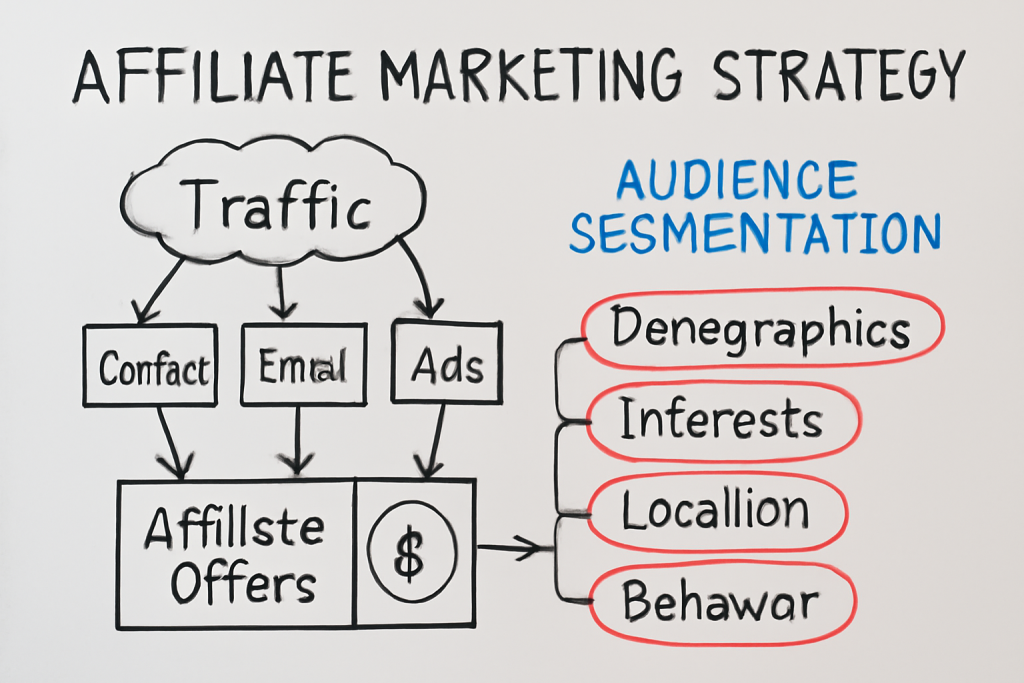The digital economy has revolutionized how individuals and businesses generate income online, with affiliate marketing emerging as one of the most lucrative and accessible monetization strategies. This performance-based marketing model allows content creators, influencers, and entrepreneurs to earn substantial commissions by promoting products and services they genuinely believe in, creating a win-win scenario for all parties involved.
Affiliate marketing represents a fundamental shift from traditional advertising models, empowering individuals to build sustainable income streams through authentic recommendations and strategic content creation. With the global affiliate marketing industry projected to reach $15.7 billion by 2024, this field offers unprecedented opportunities for those willing to invest time and effort into mastering its intricacies.
Understanding the Affiliate Marketing Ecosystem
What is Affiliate Marketing?
Affiliate marketing is a performance-based marketing strategy where businesses reward affiliates for each customer brought through the affiliate’s marketing efforts. This model operates on a simple yet powerful principle: affiliates earn commissions by promoting products or services to their audience, receiving payment only when specific actions occur, such as sales, leads, or clicks.
The affiliate marketing ecosystem consists of four key players:
Merchants (Advertisers): Companies that offer products or services and seek to expand their reach through affiliate partnerships. These businesses provide marketing materials, track conversions, and pay commissions to successful affiliates.
Affiliates (Publishers): Content creators, bloggers, influencers, and marketers who promote merchant products to their audiences. Affiliates leverage their platforms, expertise, and audience trust to drive conversions and earn commissions.
Consumers: The end users who purchase products or services through affiliate recommendations. Consumers benefit from authentic reviews, detailed information, and often exclusive deals or discounts.
Affiliate Networks: Intermediary platforms that connect merchants with affiliates, providing tracking technology, payment processing, and campaign management tools. Popular networks include ShareASale, Commission Junction, and Amazon Associates.
The Evolution of Affiliate Marketing
Affiliate marketing has undergone significant transformation since its inception in the mid-1990s. Amazon’s Associates program, launched in 1996, pioneered the concept of earning commissions through product recommendations, setting the foundation for today’s multi-billion-dollar industry.
Modern affiliate marketing encompasses diverse formats and strategies:
- Content-based affiliate marketing: Blog posts, reviews, and educational content
- Social media affiliate marketing: Instagram, YouTube, TikTok, and Facebook promotions
- Email marketing: Newsletter recommendations and targeted campaigns
- Paid advertising: Google Ads, Facebook Ads, and other paid promotion channels
- Influencer partnerships: Collaboration between brands and social media personalities
Types of Affiliate Marketing Models
Commission Structures
Understanding different commission models is crucial for maximizing affiliate earnings:
Pay-Per-Sale (PPS): Affiliates earn a percentage of the sale value when customers make purchases. This model typically offers the highest earning potential, with commissions ranging from 2% to 50% depending on the industry and product margins.
Pay-Per-Lead (PPL): Affiliates receive fixed payments for generating qualified leads, such as email signups, free trial registrations, or consultation requests. Lead commissions typically range from $1 to $500 per conversion.
Pay-Per-Click (PPC): Affiliates earn money for driving traffic to merchant websites, regardless of conversion outcomes. While offering immediate income, PPC rates are generally lower, ranging from $0.05 to $5.00 per click.
Revenue Sharing: Long-term partnerships where affiliates earn ongoing commissions from customer lifetime value, particularly common in subscription-based services and software products.
Affiliate Marketing Categories
Physical Products: Tangible goods sold through e-commerce platforms, offering moderate commission rates but broad market appeal.
Digital Products: Software, courses, ebooks, and digital tools typically providing higher commission rates (often 30-70%) due to lower overhead costs.
Services: Professional services, subscriptions, and membership programs offering recurring commission opportunities.
Financial Products: Credit cards, loans, insurance, and investment platforms providing high-value commissions but requiring specialized knowledge and compliance considerations.
Building Your Affiliate Marketing Strategies

Niche Selection and Audience Development
Successful affiliate marketing strategies require identifying profitable niches that align with your expertise and market demand. Successful affiliate marketing begins with identifying a profitable niche that aligns with your expertise, interests, and market demand. Niche specialization enables affiliates to build authority, develop targeted content, and establish trust with specific audience segments.
High-performing affiliate niches include:
Health and Wellness: Supplements, fitness equipment, mental health resources, and wellness programs consistently generate strong affiliate revenue due to evergreen demand and high customer lifetime value.
Technology and Software: Business tools, productivity software, and consumer electronics offer substantial commission opportunities, particularly in the B2B market where purchase values are higher.
Personal Finance: Credit cards, investment platforms, budgeting tools, and financial education products provide lucrative partnerships, though they require careful compliance with financial regulations.
Lifestyle and Fashion: Clothing, accessories, home decor, and beauty products appeal to broad audiences and benefit from visual marketing strategies on social media platforms.
Education and Professional Development: Online courses, certifications, books, and training programs cater to self-improvement motivated audiences willing to invest in their growth.
Content Strategy and Creation

Educational Content: Create comprehensive guides, tutorials, and how-to articles that naturally incorporate affiliate recommendations. Educational content builds trust and positions you as an authority in your niche.
Product Reviews and Comparisons: Develop detailed, honest reviews comparing different products or services. Include pros and cons, personal experiences, and clear recommendations to help readers make informed decisions.
Case Studies and Success Stories: Share real examples of how products or services have benefited you or others, providing social proof and demonstrating practical value.
Seasonal and Trending Content: Capitalize on holidays, events, and trending topics to create timely content that drives immediate traffic and conversions.
Platform Optimization
Website and Blog Development: Build a professional website optimized for search engines and user experience. Focus on fast loading times, mobile responsiveness, and clear navigation to maximize conversion rates.
Search Engine Optimization: Implement comprehensive SEO strategies to drive organic traffic. Target long-tail keywords, optimize content for featured snippets, and build high-quality backlinks to improve search rankings.
Social Media Presence: Develop strong social media profiles across relevant platforms. Share valuable content, engage with followers, and use platform-specific features like Instagram Stories, YouTube videos, and TikTok trends.
Email Marketing Integration: Build email lists to nurture relationships with your audience. Provide exclusive content, product recommendations, and special offers to subscribers.
High-Converting Affiliate Programs and Platforms
Top-Tier Affiliate Networks
Amazon Associates: The world’s largest affiliate program offers access to millions of products with commission rates ranging from 1% to 10%. While rates are moderate, the program benefits from high conversion rates due to Amazon’s trusted brand and streamlined purchasing process.
ShareASale: A premium affiliate network featuring over 4,000 merchants across diverse industries. ShareASale provides robust tracking tools, reliable payments, and access to exclusive programs with competitive commission rates.
Commission Junction (CJ Affiliate): One of the oldest and most respected affiliate networks, CJ Affiliate connects affiliates with major brands and offers advanced reporting tools and optimization features.
ClickBank: Specializing in digital products, ClickBank offers some of the highest commission rates in the industry, often ranging from 50% to 75%. The platform is particularly strong in health, wealth, and relationship niches.
Industry-Specific Programs
Software and Technology: Programs like HubSpot (up to $1,000 per sale), Shopify (up to $2,000 per referral), and various SaaS tools offer substantial commissions for qualified leads and sales.
Financial Services: Credit card programs, investment platforms, and financial tools often provide high-value commissions ranging from $50 to $500 per approved application.
Web Hosting and Domain Services: Companies like Bluehost, SiteGround, and GoDaddy offer competitive commissions (typically $50-$200 per sale) for a service with broad market appeal.
Online Education: Platforms like Udemy, Coursera, and MasterClass provide ongoing commission opportunities from course sales and subscriptions.
Advanced Monetization Techniques
Advanced affiliate marketing strategies include multi-channel promotion, conversion optimization, and strategic partnerships.
Multi-Channel Marketing Approach
Cross-Platform Promotion: Leverage multiple channels simultaneously to maximize reach and conversions. Share content across your blog, social media, email newsletter, and video platforms to capture audiences at different touchpoints.
Retargeting Campaigns: Implement pixel tracking and retargeting ads to re-engage visitors who didn’t convert initially. Retargeting can increase conversion rates by 70% to 100% according to industry studies.
Influencer Collaborations: Partner with other influencers and content creators to expand your reach. Joint ventures, guest posts, and cross-promotions can introduce your affiliate recommendations to new audiences.
Conversion Rate Optimization
A/B Testing: Continuously test different elements of your content, including headlines, call-to-action buttons, product placement, and promotional strategies to identify the highest-converting approaches.
Urgency and Scarcity: Incorporate limited-time offers, exclusive deals, and scarcity elements to encourage immediate action from your audience.
Trust Signals: Display testimonials, certifications, and trust badges to build credibility and reduce purchase hesitation.
Value-Added Bonuses: Offer exclusive bonuses, additional resources, or personal consultations to incentivize purchases through your affiliate links.
Advanced Tracking and Analytics
Attribution Modeling: Understand the customer journey across multiple touchpoints to optimize your marketing efforts and allocate resources effectively.
Lifetime Value Analysis: Focus on promoting products and services that generate recurring revenue or lead to repeat purchases, maximizing long-term earnings.
Cohort Analysis: Track the performance of different audience segments to identify the most valuable traffic sources and customer types.
SEO Strategies for Affiliate Marketing Success

Implementing comprehensive affiliate marketing strategies requires strong SEO foundations to drive organic traffic and conversions.
Keyword Research and Content Optimization
Long-Tail Keyword Targeting: Focus on specific, lower-competition keywords that indicate purchase intent, such as “best [product] for [specific use case]” or “[product] vs [competitor] comparison.”
Commercial Intent Keywords: Target keywords that demonstrate buying intent, including terms like “review,” “best,” “top,” “compare,” and “buy.”
Featured Snippet Optimization: Structure content to capture featured snippets by answering common questions clearly and concisely, including comparison tables and step-by-step instructions.
Local SEO: For location-specific products or services, optimize for local search terms and create location-based content to capture geographic markets.
Link Building and Authority Development
Resource Page Link Building: Identify websites in your niche that maintain resource pages and request inclusion of your high-quality content.
Guest Posting: Contribute valuable content to authoritative websites in your niche, building backlinks and establishing thought leadership.
Broken Link Building: Find broken links on relevant websites and offer your content as a replacement, providing value while earning quality backlinks.
Digital PR: Develop newsworthy content, surveys, or studies that attract media attention and natural link acquisition.
Legal and Ethical Considerations
FTC Compliance and Disclosure Requirements
Clear and Conspicuous Disclosures: The Federal Trade Commission requires affiliates to clearly disclose their relationship with merchants. Use phrases like “This post contains affiliate links” or “I may earn a commission from purchases made through links in this post.”
Placement and Visibility: Disclosures must be easily visible and placed before affiliate links. Avoid burying disclosures in footnotes or hard-to-find locations.
Platform-Specific Requirements: Different platforms have varying disclosure requirements. Instagram requires #ad or #affiliate hashtags, while YouTube has built-in disclosure tools.
Ethical Marketing Practices
Honest Recommendations: Only promote products and services you genuinely believe in and would recommend to friends or family members.
Balanced Reviews: Provide honest assessments including both positive and negative aspects of products, building trust and credibility with your audience.
Audience First Approach: Prioritize your audience’s needs and interests over commission potential, focusing on long-term relationship building rather than short-term gains.
Tools and Resources for Affiliate Marketers

Essential Marketing Tools
Tracking and Analytics: Google Analytics, affiliate network dashboards, and specialized tracking tools like Voluum or RedTrack provide detailed performance insights.
Content Creation: Canva for graphics, Grammarly for writing assistance, and video editing tools like Filmora or Adobe Premiere Pro enhance content quality.
SEO Tools: Ahrefs, SEMrush, or Moz provide keyword research, competitor analysis, and ranking monitoring capabilities.
Email Marketing: Platforms like ConvertKit, Mailchimp, or ActiveCampaign enable effective list building and nurturing campaigns.
Automation and Efficiency Tools
Social Media Management: Buffer, Hootsuite, or Later streamline social media posting and engagement across multiple platforms.
Link Management: Pretty Links or ThirstyAffiliates help organize and cloak affiliate links while providing click tracking.
Content Planning: Editorial calendars and project management tools like Trello or Asana keep content creation organized and consistent.
These essential tools support the execution of effective affiliate marketing strategies across all campaign phases.
Income Potential and Realistic Expectations
Earnings Benchmarks by Experience Level
Beginner Affiliates (0-6 months): New affiliates typically earn $0 to $500 monthly as they build their audience and learn effective strategies. Focus should be on consistent content creation and audience development.
Intermediate Affiliates (6 months – 2 years): With established audiences and refined strategies, intermediate affiliates often earn $500 to $5,000 monthly, depending on niche and effort invested.
Advanced Affiliates (2+ years): Experienced affiliates with large audiences and optimized systems can earn $5,000 to $50,000+ monthly, with top performers reaching six and seven-figure annual incomes.
Factors Affecting Income Potential
Audience Size and Engagement: Larger, more engaged audiences generally generate higher affiliate income, but niche relevance often matters more than raw numbers.
Commission Rates and Product Values: High-ticket items and generous commission structures significantly impact earning potential.
Content Quality and Trust: Well-researched, honest content builds audience trust and increases conversion rates.
Consistency and Persistence: Regular content creation and long-term commitment are essential for building sustainable affiliate income.
Future Trends and Opportunities
Emerging Technologies and Platforms
Emerging affiliate marketing strategies will leverage AI, voice search, and immersive technologies to enhance conversion rates.
Voice Search Optimization: As voice assistants become more prevalent, optimizing content for voice search queries will become increasingly important for affiliate marketers.
Artificial Intelligence Integration: AI tools for content creation, audience analysis, and personalized recommendations will enhance affiliate marketing efficiency and effectiveness.
Augmented Reality (AR) and Virtual Reality (VR): Immersive technologies will create new opportunities for product demonstrations and interactive affiliate experiences.
Blockchain and Cryptocurrency: Decentralized affiliate programs and cryptocurrency-based rewards systems may revolutionize how affiliates are tracked and compensated.
Industry Evolution
Increased Focus on Authenticity: Consumers increasingly value genuine recommendations over traditional advertising, creating opportunities for affiliates who prioritize honesty and transparency.
Micro-Influencer Marketing: Smaller, highly engaged audiences often outperform large followings in terms of conversion rates and brand loyalty.
Video-First Content: Video content continues to dominate online engagement, making platforms like YouTube, TikTok, and Instagram Reels essential for affiliate success.
Subscription and Recurring Revenue Models: The growth of subscription-based products creates opportunities for affiliates to earn ongoing commissions from single conversions.
Building Long-Term Affiliate Marketing Success
Sustainable Business Practices
Diversification Strategy: Avoid relying on single products, programs, or traffic sources. Build multiple income streams across different affiliates and promotional channels.
Relationship Building: Cultivate strong relationships with affiliate managers, fellow marketers, and your audience to create mutually beneficial partnerships.
Continuous Learning: Stay updated on industry trends, algorithm changes, and new marketing strategies through courses, conferences, and industry publications.
Data-Driven Decision Making: Regularly analyze performance metrics to identify opportunities for optimization and growth.
Scaling Your Affiliate Business
Team Building: As your business grows, consider hiring virtual assistants, content creators, or specialists to handle routine tasks and expand your capabilities.
System Development: Create standardized processes for content creation, promotion, tracking, and optimization to ensure consistent quality and efficiency.
Technology Investment: Invest in advanced tools and platforms that automate repetitive tasks and provide deeper insights into your performance.
Strategic Partnerships: Develop partnerships with other businesses, influencers, and content creators to expand your reach and access new opportunities.
Conclusion
Affiliate marketing represents one of the most accessible and scalable opportunities for generating online income in 2025. With the digital economy continuing to expand and consumer behavior increasingly favoring online research and purchasing, the potential for affiliate marketing success has never been greater.
Success in affiliate marketing requires a strategic approach that combines audience development, content creation, SEO optimization, and ethical marketing practices. While building a profitable affiliate business takes time and consistent effort, the potential rewards – both financial and personal – make it an attractive option for entrepreneurs, content creators, and anyone seeking location-independent income.
The key to long-term success lies in maintaining focus on providing genuine value to your audience rather than simply chasing commissions. By building trust, creating high-quality content, and staying committed to ethical practices, affiliate marketers can build sustainable businesses that benefit all parties involved: merchants gain customers, affiliates earn income, and consumers receive valuable recommendations for products and services that improve their lives.
As the affiliate marketing industry continues to evolve with new technologies, platforms, and consumer preferences, those who remain adaptable, continue learning, and maintain their commitment to authenticity will be best positioned to capitalize on the tremendous opportunities that lie ahead.
Ready to start your affiliate marketing journey? Begin by selecting a niche you’re passionate about, researching affiliate programs in that space, and creating your first piece of valuable content. Remember, success in affiliate marketing is built one authentic recommendation at a time.




Thank you
Thank you
Thank you
Thank you